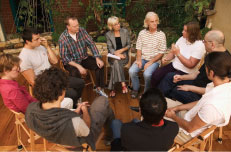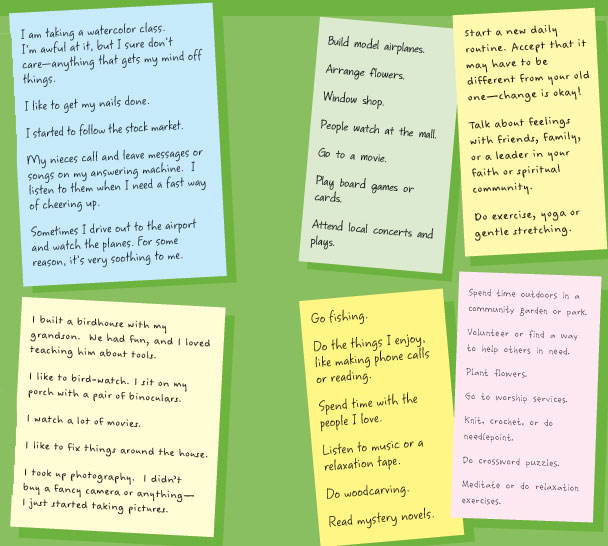|
Your Feelings
Stress
Hope
Gratitude
Anxiety
Fear
Sadness and Depression
Anger
Guilt
Loneliness
Denial
Ways You Can Cope
|
"Life has changed again and
I can't help feeling frustrated
with all that's going on.
One minute I'll be upset and
angry. Then the next minute,
I'll start crying all of a sudden.
I just never know what's
coming next." - Kathy |
People feel so many emotions when they find out that their
cancer has come back. Shock, fear, anger, and denial are just
a few. The new diagnosis hits them as hard as it did the first
time, or even harder.
Regardless of your first reaction, starting cancer treatment
again can place even more demands on your mind and
spirit. You'll have good days and bad days. So just remember
that it's okay to feel a lot of different emotions.
Some of these emotions may be ones you have had at other
times in your life. But you may be feeling them more intensely.
If you have dealt with them in the past, you may be able to
cope with them now, too. If some of the feelings are new, or
are so strong that it is hard to get through everyday activities,
you may want to ask for help.
There are many people who may be able to help you. These
include
health psychologists, oncology social workers, other
mental health experts, and leaders in your faith or spiritual
community. They know many ways to help you cope with
your feelings. See Ways You Can Cope for other ideas on
how to cope.
|
"Once you get diagnosed again and go through more
surgeries or procedures, your life is not normal. It's always
in the back of your mind. What now? What's next?" - Margaret |
Stress is a normal reaction to cancer. After all, you're dealing
with a lot: treatment, family, your job, money, and day-to-day
living. Sometimes, you may not even notice that you are
stressed. But your family and friends probably see a change.
Anything that makes you feel calm or relaxed may help. So
try to think of things that relax you and that you enjoy
doing. Some people try deep breathing, listening to tapes
that have nature sounds, or listening to music. See below for more ideas on how to relieve stress.
|
"I just keep telling myself, 'You've got to have hope, you've
got to have faith, because anything can happen.'" - Phil |
While you may be sad or depressed about your cancer
recurrence, you do have reasons to feel hopeful. Science
has advanced and cancer treatments have improved. So more
people are surviving cancer than ever before. Nearly 10
million people who have a history of cancer are alive today.
In other words, cancer is becoming a disease that doctors
can manage. To help build your sense of hope:
- Plan your days as you have always done.
- Don't limit the things you like to do just because you
have cancer.
- Look for your own reasons to have hope.
|
"I do have a lot of bad days, but you know, I don't talk
about those. I forget those. I think about all the good
things, and I have a lot of nice times when I'm with my
grandchildren, when I go to church, and when I'm with my
friends." - Helen |
Some people see their cancer coming back as a "wake-up
call." They may realize the importance of enjoying the little
things in life. They go places they've never been. They finish
projects they had started but put aside. They spend more
time with friends and family. They mend broken
relationships.
It may be hard at first, but you can find joy in your life. Take
note of what makes you smile. Pay attention to the things
you do each day that you enjoy. They can be as simple as
drinking your morning coffee, sitting with a pet, or talking
to a friend. These small, day-to-day activities can give you
comfort and pleasure.
You can also do things that are more meaningful to you.
Everyone has special things, both large and small, that bring
meaning to their life. For you, it may be visiting a garden in your city or town. It may be praying in a certain chapel. Or it
could be playing golf or some other sport that you love.
Whatever you choose, embrace the things that bring you joy
when you can.
|
"I just get myself worked up a lot. There are so many
things to deal with now. And I still have to deal with all
the things that were going on before I got sick again. How
am I going to get to the store before it closes? Has the dog
been fed? What about the report that's due at work?
I start to panic when I think of all the things on my plate." - Jing |
Cancer takes a toll on both your body and your mind. You
are coping with so much now. You may feel overwhelmed.
Pain and medicines for pain can also make you feel anxious
or depressed. And you may be more likely to feel this way if
you have had these feelings before.
Here are some signs of anxiety:
- Feeling very tense and nervous
- Racing heartbeat
- Sweating a lot
- Trouble breathing or catching your breath
- Having a lump in your throat or a knot in your
stomach
- Feeling fear.
Feeling anxious can be normal. But if it begins to disrupt your
daily life, tell a member of your health care team. They can
suggest someone for you to talk to. Or they can give you
medicines that will help. Some of the nondrug choices for pain
may work for your anxiety as well (see above).
|
"Every tomorrow has two handles. We can take hold of it
with the handle of anxiety or with the handle of faith." - Henry Ward Beecher |
|
"Honestly, I feel scared about a lot of things. Things I try
not to think about. It comes and goes, but there always
seems to be something. Even when I am having good days,
the fear is always in the back of my mind. It never goes
away really." - Deena |
It's normal to feel scared and worried. You may be afraid of
pain or other side effects, either from the cancer or the
treatment. You may worry about looking different as a result
of your treatment. You may worry about taking care of your
family, paying your bills, and keeping your job. You may be
afraid of dying.
It's hard to deal with the fear of so many unknowns. Some
people say it helps if you know what to expect in the future.
Ask your health care team questions, so you can understand
more about your cancer and treatment choices. Also, update
your will and other legal papers, if you haven't already done
so. Then you won't have to worry about them.
Fear can be overwhelming. Remember that others have felt
this way, too. It's okay to ask for help.
|
"I feel sad a good bit of the time now. One thing that
cheers me up is to be with my 4-year-old grandson. I love
watching him as he grows more and more each day.
Sometimes just thinking about him makes me feel better." - Edmund |
Sadness is a normal response to any serious illness. You may
feel sad that you have to go through treatment again. You
may feel sad that life won't be quite the same from now on.
It's okay to feel blue. You don't need to be upbeat all the
time or pretend to be cheerful. Many people say that they
want the freedom to just give in to their feelings sometimes.
But others say that it helps to look for what is good in life,
even in the bad times.
Depression can happen when sadness or despair seems to
take over your life. Some of the signs listed on the next page
are normal at a time like this. But if they last more than 2
weeks, talk to your doctor. Some symptoms could be due to
physical problems. This is why it's important to let your
doctor know about them.

|
Signs of Depression
- Feeling helpless or hopeless, or that life has no
meaning
- No interest in family, friends, hobbies, or things
you used to enjoy
- Loss of appetite
- Feeling short-tempered and grouchy
- Not being able to get certain thoughts out of
your mind
- Crying for long periods of time or many times
each day
- Thinking about hurting or killing yourself
- Feeling "wired," having racing thoughts or
panic attacks
- Sleep problems, such as not being able to sleep,
having nightmares, or sleeping too much.
|
|
"It challenged my faith... But I've come out of it okay. It
was tough in the beginning, trying to understand why God
would do this to me." - Bob |
You may also feel angry or frustrated. It's normal to ask,
"Why me?" You may be mad at the cancer, your doctors, or
your loved ones. If you are religious, you might even be
angry with God. If you feel angry, it's helpful to remember
that you don't have to pretend that everything is okay.
Try to figure out why you are angry. Anger sometimes comes
from feelings that are hard to show. These might be fear,
panic, frustration, worry, or helplessness.
It's not always easy to look at what is causing your anger. But
it's healthy to try. Being open and dealing with your anger may
help you let go of it. It's also good to know that anger is a form
of energy. You can express this energy through exercise, art, or
even just hitting the bed with a pillow.

|
"I am so tired all the time. I feel bad that my mom has to
take care of me and handle things for me like she did when
I was younger. I see everything she and Dad are dealing
with, yet there's nothing I can do about it. I know they
hate the fact that I'm going through this. I try to do what
I can, but I can't stop feeling guilty for what they are
going through, too." - Anne |
It's normal for some people to wonder whether they did
things that caused their cancer to recur. People feel guilty
for a number of reasons:
- They worry about how their family and friends feel.
- They envy other people's good health and are
ashamed of this feeling.
- They blame themselves for certain lifestyle choices.
- They feel guilty that their first treatment didn't work.
- They wonder if they waited too long to go back to the
doctor. Or they fear that they didn't follow the
doctor's instructions the right way.
But it's important to remember that the treatment failed you.
You didn't fail the treatment. We can't know why cancer returns
in some people and not others. So, it's important for you to
try to:
- Focus on things worthy of your time and energy.
- Let go of any mistakes you think you may have made.
- Forgive yourself.
You may want to share these feelings with your loved ones.
Some people blame themselves for upsetting the people they
love or worry that they'll be a burden to others. If you feel
this way, take comfort knowing that many family members
say that it is an honor and a privilege to care for their loved
one. Many consider it a time when they can share
experiences and become closer to one another. Others say
that caring for someone else makes them take life more
seriously and causes them to reevaluate their priorities.
If you don't feel that you can talk openly about these things
with your loved ones, getting counseling or joining a support
group may also help. Let your health care team know if you
would like to talk with someone about your feelings.
|
"I have lots of people around me who care, but I still feel
like no one really understands." - Carlos |
You may feel lonely, even when lots of people support and
care for you. Here are some common feelings:
- You feel like no one else understands what you're
going through, even those you love and care about.
- You feel distant from others. Or you find that your
family and friends have a hard time dealing with
your cancer.
- You realize that you aren't able to take part in as
many events and activities as you used to.
Although it may be harder some days than others, remember
that you aren't alone. Continue to do the things you've always
done as best you can. If you want to, tell people that you
don't want to be alone and that you welcome their visits.
More than likely, your loved ones have feelings like yours.
They may feel isolated from you and lonely if they are unable
to talk with you.
You may feel that this is not happening to you. It's tough to
accept that the cancer has come back. Feeling that you need
more time to absorb everything is natural. You may need
more time to adjust to the news. But this can become a
serious problem if it lasts longer than it should. It can keep
you from getting the treatment you need or talking about
your treatment choices. As time passes, try to keep an open
mind. Listen to what others around you suggest for your care.
Your feelings will come and go, just like they always have. If
you have some strategies to deal with them, you have already
taken a step in the right direction.
Know that many other people have been where you are.
Some do better when they join a support group. It helps
them to talk with others who are facing the same challenges.
You may prefer to join an online support group. That way
you can chat with people from home. Be sure to check the
privacy issues before you join.
If support groups don't appeal to you, there are many experts
who are trained to give cancer support. These include
oncology social workers, psychologists or health psychologists,
counselors, or members of your faith or spiritual community.
For more information, see the
Resources section.
| A Word About Support Groups |
You may have heard about support groups in your area
for people with cancer. They can meet in person, by
phone, or over the Internet. They may help you gain new
insights into what's happening, get ideas about how to
cope, and help you know that you're not alone.
In a support group, people may talk about their feelings
and what they have gone through. They may trade advice
and try to help others who are dealing with the same
kinds of issues. Some people like to go and just listen.
Others prefer not to join support groups at all. Some
people aren't comfortable with this kind of sharing.
If you feel like you would enjoy outside support such as
this, but can't get to a group in your area, try a support
group on the Internet. Some people with cancer say that
Web sites with support groups have helped them a lot. |

|
"What I need at least once or
twice a week is to talk to one or
a group of people who are in
the same shoes as I am." - Vince |
Ways You Can Cope
You may be able to
continue many of
your regular
activities, even
though some may
be more difficult
than before.
Whatever you do,
remember to
conserve your
strength for the
things you really
want to do. Don't
plan too many
things for one day.
Also try to stagger
them during
the day.
Here are some
things other people
with cancer say
have helped them
cope. As you can
see, even the little
things help!

Back to Top
< Previous Section | Next Section > |